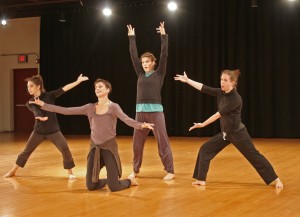 When a dance group performs sans costumes, elaborate light cues and even a stage, yet still manages to inspire and impress its audience, then you know you’re in the presence of true talent.
When a dance group performs sans costumes, elaborate light cues and even a stage, yet still manages to inspire and impress its audience, then you know you’re in the presence of true talent.
Monica Bill Barnes & Company — a contemporary New York City-based group that describes itself as “dance theatre” — came to do an informal performance and lecture in Spurrier Dance Studio this past Sunday, thanks to Rochester’s Program of Dance and Movement. The premise of the show was to unveil the behind-the-scenes creative process of choreography, an art intricately related to — yet very distinct from — dance. Monica Bill Barnes’ choreography isn’t just any choreography, though; it’s full of delightful, unexpected turns while remaining simultaneously relatable.
“I want audience members to identify with dancers, not admire them. There needs to be a sense of common ground,” Barnes said during the lecture section of the show after the performance.
A connection with the audience was amply palpable in Sunday’s performance through, if nothing else, the expressive faces of the dancers. Often times in performance, dancers either present an ambiguously deadpan expression or a standard smile. Barnes and her company, which includes her and three other women — Anna Bass, Giulia Carotenuto and
Christina Robson — tell a narrative through their movement and leave no part of their bodies out of the equation. They make a range of exaggerated expressions while they dance, just as an actor might do in a scene.
As someone who dances and who been to numerous dance performances, I can say that this was one of the most memorable aspects to their informal show. It’s so different from what most choreographers tell their dancers, which is to leave their expression out of the equation, because it would distract the audience from the dance itself.
The evening was structured in such a way that Barnes showed us the entire experience of eventually turning something into a full-scale dance for use in her currently touring show, which is called “Everything Is Getting Better All the Time.” The process is similar to writing a rough draft of an essay, continuously revising it and then turning in a final draft for a grade.
One example that Barnes and her company showed us was a dance inspired by a family wedding she attended. She saw comedy in the idea of many generations of family gathering together to dance in different styles to music that none of them is quite familiar with.
After returning home, she opened a dialogue with her company members about the divide between socially appropriate dancing that one might do at a wedding versus learned dance skills gained through years of practice.
Soon, this conversation became choreography for a dance that they refer to as “The Wedding Dance,” which uses each dancer to representing the different generations of a family — the grandparents who just sway, for fear of breaking a hip; the little kids who run in circles around the dance floor; the parents who are too drunk to dance and the teenagers who want to krump, but can’t figure out how to do it to “We Are Family” by Sister Sledge. The catch, though, is that Barnes and her dancers intertwined their representations with their technical abilities as learned dancers.
Through this performance in Spurrier, we received a rare view of how a dance goes from an idea to a conversation and then to the intricate choreography that the company now performs regularly for audiences. I can only imagine what these dancers would be capable of if they were doing a formal performance.
Sklar is a member of the class of 2014.




